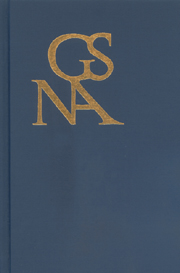Book contents
- Frontmatter
- Contents
- Towards a German Romantic Concept of the Ballad: Goethe's “Johanna Sebus” and Its Musical Interpretations by Zelter and Reichardt
- “Trübe” as the Source of New Color Formation in Goethe's Late Works Entoptische Farben (1817–20) and Chromatik (1822)
- The Myth of Otherness: Goethe on Presence
- The Transformation of the Law of Nations and the Reinvention of the Novella: Legal History and Literary Innovation from Boccaccio's Decameron to Goethe's Unterhaltungen deutscher Ausgewanderten
- “Hear him! hört ihn!”: Scholarly Lecturing in Berlin and the Popular Style of Karl Philipp Moritz
- Hypochondria, Onanism, and Reading in Goethe's Werther
- Judex! Blasphemy! and Posthumous Conversion: Schiller and (No) Religion
- Esoterik der “Macht, die über uns waltet und alles zum Besten lenkt”: Das Wissen vom Anderen in Goethes Wilhelm Meisters Lehrjahre
- Goethes Fortgepflanztes: Zur Unbegrifflichkeit der Morphologie
- Special Section on Die Entstehung der Neueren deutschen Literaturwissenschaft aus der Goethe-Philologie
- Book Reviews
The Transformation of the Law of Nations and the Reinvention of the Novella: Legal History and Literary Innovation from Boccaccio's Decameron to Goethe's Unterhaltungen deutscher Ausgewanderten
Published online by Cambridge University Press: 05 February 2013
- Frontmatter
- Contents
- Towards a German Romantic Concept of the Ballad: Goethe's “Johanna Sebus” and Its Musical Interpretations by Zelter and Reichardt
- “Trübe” as the Source of New Color Formation in Goethe's Late Works Entoptische Farben (1817–20) and Chromatik (1822)
- The Myth of Otherness: Goethe on Presence
- The Transformation of the Law of Nations and the Reinvention of the Novella: Legal History and Literary Innovation from Boccaccio's Decameron to Goethe's Unterhaltungen deutscher Ausgewanderten
- “Hear him! hört ihn!”: Scholarly Lecturing in Berlin and the Popular Style of Karl Philipp Moritz
- Hypochondria, Onanism, and Reading in Goethe's Werther
- Judex! Blasphemy! and Posthumous Conversion: Schiller and (No) Religion
- Esoterik der “Macht, die über uns waltet und alles zum Besten lenkt”: Das Wissen vom Anderen in Goethes Wilhelm Meisters Lehrjahre
- Goethes Fortgepflanztes: Zur Unbegrifflichkeit der Morphologie
- Special Section on Die Entstehung der Neueren deutschen Literaturwissenschaft aus der Goethe-Philologie
- Book Reviews
Summary
Even prior to its publication in Friedrich Schiller's literary journal Die Horen in 1795, Goethe's novella cycle Unterhaltungen deutscher Ausgewanderten had already been assigned an eminent place in literary history: in a letter dated November 7, 1794, Schiller informed his friend Christian Körner that Goethe “ist jetzt beschäftigt, eine zusammenhängende Suite von Erzählungen im Geschmack des Decameron des Boccaz auszuarbeiten.” Indeed, the structural borrowing from the Decameron is so undisguised in Unterhaltungen that it is undoubtedly meant to revive, under entirely new historical conditions, the genre of the novella as established by Boccaccio (1313-75). As evident as Goethe's indebtedness to Boccaccio is, and as dutifully as informed readers of Unterhaltungen, from its first reviewers to recent scholars, note this indebtedness, neither the structural continuity between the Decameron and Unterhaltungen nor the variations and innovations undertaken by the latter have been subjected to historical and theoretical scrutiny. As a consequence, both the historical conditions making Goethe's reinvention of the novella possible and the functions performed by this reinvention remain in the dark.
This essay approaches Goethe's reinvention of the novella from a legal historical perspective. The novella first came into being as a legal genre, referring to novellae leges or new laws that were issued by the Roman emperors of late Antiquity after previous imperial enactments or constitutiones had been compiled into the Codex Theodosianus (438 CE) and Codex Justinianus (534 CE).
- Type
- Chapter
- Information
- Goethe Yearbook 19 , pp. 67 - 92Publisher: Boydell & BrewerPrint publication year: 2012

